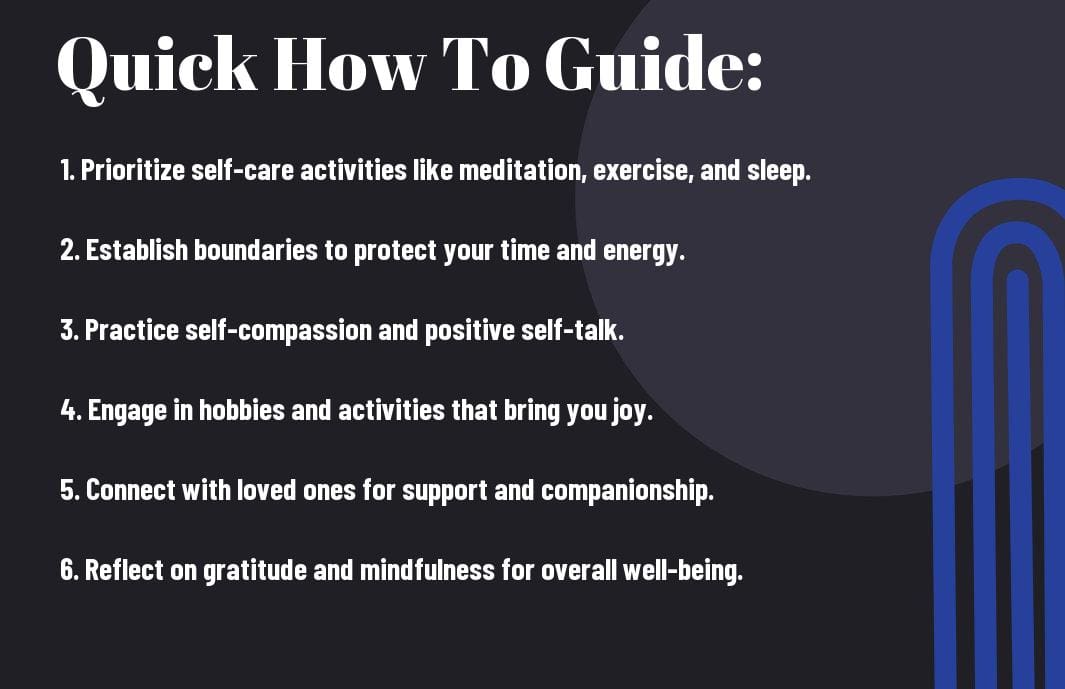Self-care is not just about pampering yourself occasionally; it is a crucial practice that can lead to sustainable happiness in your life. In this blog post, we will explore the key self-care practices that can help you prioritize your well-being and cultivate a lasting sense of contentment. By incorporating these necessary self-care strategies into your daily routine, you can boost your mental, emotional, and physical health, ultimately leading to a more fulfilling and happier life. Let’s research into the power of self-care and discover how you can achieve long-lasting happiness through simple yet impactful practices.
Key Takeaways:
- Personalized self-care: Tailor self-care practices to your own needs and preferences.
- Consistent routines: Establish regular self-care rituals to promote sustainable happiness and well-being.
- Mindfulness and self-awareness: Practice mindfulness and self-awareness to understand your needs and emotions better and connect with yourself on a deeper level.

Cultivating a Positive Mindset
Mindfulness Practices
There’s immense power in cultivating a positive mindset through mindfulness practices. By focusing on the present moment without judgment, individuals can enhance self-awareness and promote emotional regulation. Mindfulness helps in reducing stress, anxiety, and depression by fostering a greater sense of inner peace and gratitude.
Reframing Negative Thoughts
Even when faced with challenges, reframing negative thoughts can significantly impact one’s overall happiness and well-being. By reinterpreting situations in a more positive light, individuals can shift their perspectives to see opportunities for growth and resilience. This practice empowers individuals to overcome setbacks with a renewed sense of optimism and determination.
Practices such as journaling, positive affirmations, and cognitive reframing techniques can be powerful tools in cultivating a positive mindset. Journaling allows individuals to reflect on their thoughts and emotions, while positive affirmations help reinforce a belief in one’s abilities and worth. Cognitive reframing involves challenging and changing negative thought patterns to foster a more optimistic outlook on life. These practices, when done consistently, can transform one’s mindset and contribute to long-lasting happiness and well-being.

Creating a Nurturing Routine
Daily Self-Care Checklist
For sustainable happiness, it is crucial to establish a daily self-care checklist to nurture your mind, body, and soul. This checklist can include activities such as meditation, exercise, healthy eating, journaling, and spending time outdoors. By consistently practicing these self-care rituals, you are prioritizing your well-being and setting the foundation for a more fulfilling life.
The Role of Sleep and Nutrition
There’s no denying the vital role that sleep and nutrition play in achieving sustainable happiness. Quality sleep is necessary for cognitive function, mood regulation, and overall health. Likewise, a balanced diet rich in nutrient-dense foods provides the fuel your body needs to function optimally. By prioritizing adequate sleep and nourishing your body with nutrient-dense foods, you are investing in your long-term happiness and well-being.
Nurturing your body with proper sleep and nutrition not only supports your physical health but also has a profound impact on your mental and emotional well-being. Lack of sleep and poor nutrition can lead to increased stress levels, lowered immunity, and negative mood changes. By making conscious choices to prioritize quality sleep and nutrient-rich foods, you are equipping yourself with the tools to enhance your overall happiness and quality of life.
Physical Activity for Mental Well-Being
Exercise as a Form of Self-Care
To achieve sustainable happiness through self-care practices, incorporating physical activity into your routine is crucial. Exercise is not only beneficial for your physical health but also plays a significant role in improving your mental well-being. Engaging in regular exercise releases endorphins, the feel-good neurotransmitters, which can help reduce stress, anxiety, and symptoms of depression. Additionally, physical activity promotes better sleep, boosts self-esteem, and enhances overall mood, making it a powerful form of self-care.
Tips for Incorporating Movement Into Your Life
To make physical activity a sustainable part of your self-care routine, it is crucial to find ways to incorporate movement into your daily life. Whether it’s taking a brisk walk, dancing to your favorite music, or practicing yoga, finding activities you enjoy is key to staying consistent. Make it a priority to schedule time for exercise, even if it’s just for a few minutes each day. Setting realistic goals and tracking your progress can help you stay motivated and committed to your fitness routine. Recognizing the impact of physical activity on your mental well-being is crucial in achieving sustainable happiness through self-care practices.
- Find activities you enjoy: Whether it’s hiking, swimming, or cycling, choose activities that bring you joy.
- Schedule regular exercise: Set aside time in your day dedicated to physical activity to make it a habit.
- Set realistic goals: Start small and gradually increase the intensity of your workouts to avoid burnout.
- Track your progress: Keep a journal or use fitness apps to monitor your achievements and stay motivated.
- Recognizing the positive impact: Reflect on how exercise makes you feel mentally and emotionally, and use that as motivation to keep moving forward.
Building Strong Relationships
Connecting with Others
Keep in mind that nurturing relationships with others is important for sustainable happiness. Whether it’s friends, family, or colleagues, forming meaningful connections can bring joy and fulfillment to your life. While it’s important to focus on self-care, don’t underestimate the power of social interaction in boosting your overall well-being.
Setting Healthy Boundaries
While it’s crucial to prioritize relationships, it’s also important to set healthy boundaries to protect your mental and emotional well-being. Boundaries help define expectations, responsibilities, and limits in relationships, ensuring that you maintain a healthy balance between giving and receiving. Setting boundaries can prevent burnout, resentment, and maintain respect in your interactions with others.
Connecting with others is a beautiful part of life, but it’s equally important to know when to say no and prioritize your needs. Healthy boundaries can help you cultivate mutually respectful relationships, where both parties feel valued and heard. By clearly communicating your boundaries, you set the stage for open and honest connections based on trust and understanding.
Managing Stress and Overcoming Obstacles
Now, in the journey towards sustainable happiness, it’s crucial to address stress and overcome obstacles that can hinder our progress. By managing stress effectively and learning how to deal with setbacks, we can navigate life’s challenges with resilience and positivity.
Stress-Reduction Techniques
An crucial aspect of self-care is incorporating stress-reduction techniques into our daily routine. Practices such as mindfulness meditation, deep breathing exercises, yoga, or spending time in nature can help us unwind and calm our minds. Investing time in self-care activities that promote relaxation can significantly reduce stress levels and improve overall well-being.
Dealing with Setbacks
Overcoming obstacles and setbacks is a crucial part of the self-care journey. It’s important to remember that setbacks are a natural part of life, and how we choose to respond to them can make all the difference. Dealing with setbacks requires resilience, perseverance, and a positive mindset. When faced with challenges, it’s crucial to acknowledge our emotions, seek support from loved ones, and learn from the experience. By embracing setbacks as opportunities for growth and self-discovery, we can emerge stronger and more resilient.
Lifelong Self-Care Commitment
Integrating Self-Care into Your Lifestyle
All successful self-care strategies stem from a crucial element – consistency. Consistency is key when it comes to integrating self-care practices into your everyday life. Make self-care a non-negotiable part of your routine. Whether it’s setting aside time for exercise, meditation, or simply practicing gratitude daily, these small acts can make a big impact on your overall well-being. Recall, self-care is not a one-time event but a lifelong commitment to yourself.
Recognizing and Celebrating Progress
Now is the time to reflect on the progress you have made on your self-care journey. Celebrate your victories, no matter how small they may seem. Recognizing the positive changes in your mental, physical, and emotional well-being can boost your motivation to continue practicing self-care. Use a journal to track your progress and celebrate each milestone achieved along the way.
Plus, remember that self-care is not about perfection, but progress. It’s normal to experience setbacks or challenges along the way. What matters most is your commitment to your well-being and your ability to learn and grow from each experience.
Final Words
Now that you understand the importance of self-care practices in achieving sustainable happiness, it’s time to prioritize your well-being. By practicing self-care regularly, you can boost your mental, emotional, and physical well-being, leading to a more fulfilling and balanced life. Remember to listen to your needs, set boundaries, engage in activities that bring you joy, and seek support when necessary. Implementing self-care into your daily routine is a powerful tool to enhance your overall happiness and well-being. Take care of yourself, because you deserve it!
FAQ
Q: What is self-care and why is it important for sustainable happiness?
A: Self-care refers to the intentional actions taken to care for one’s physical, mental, and emotional well-being. It is crucial for sustainable happiness as it allows individuals to recharge, reduce stress, and build resilience to face life’s challenges.
Q: What are some self-care practices that can contribute to sustainable happiness?
A: Some self-care practices that can help achieve sustainable happiness include regular exercise, sufficient sleep, healthy eating, mindfulness meditation, spending time in nature, setting boundaries, and engaging in activities that bring joy and fulfillment.
Q: How can one cultivate a consistent self-care routine for long-term sustainable happiness?
A: To establish a consistent self-care routine, it is crucial to prioritize self-care as a non-negotiable part of your daily routine. This can be done by planning and scheduling self-care activities, seeking support from loved ones, being kind to yourself, and adapting your self-care routine as needed to meet your evolving needs.




